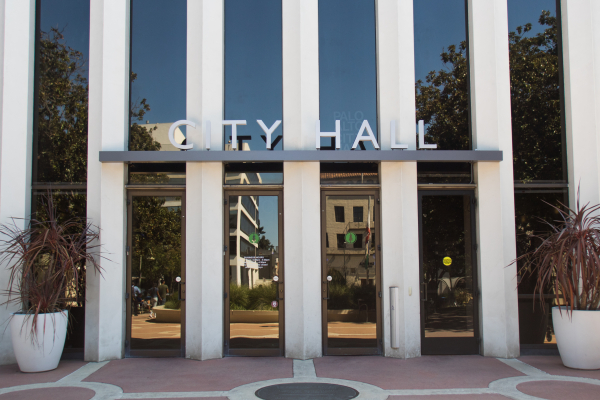
Palo Alto City Hall is now closed to the public -- the ground floor is open, but residents, the press and the general public cannot go to any other floor unless they have a) specific permission and b) an employee escort. The elevator needs a keycard to open, a resident must wait for an employee to come down and must be escorted to one of the desired the six levels above. This closed-to-the public ruling is courtesy of City Manager Ed Shikada.
Yes, Palo Alto has its own little “fortress” in the center of our downtown. One more blow against city transparency and an open government.
Henceforth, you and I can only enter the ground floor of city hall, search for a nonexistent receptionist, then walk toward the back, find the interactive kiosk, with a phone, check a directory to find the number of the department you want to call, for example, the city clerk’s office or the transportation chief, call up, then wait for an employee to come down the elevator with his keycard, take you up to the department, and finally meet with whom you want to see.
Whew!
Is this a harbinger of our future lack of transparency? Remember encryption?
Why is this happening, you may ask. Good question!
I was bewildered and dismayed when I heard about it from resident Jeanne Fleming, who discovered the closure when she recently visited our public center and kindly called me because she was upset. “What is this -- a lockdown?” Fleming asked. “It seems so extreme!”
I called Meghan Horrigan Taylor, chief communications officer, and she subsequently sent an email which read, in part, “Before the pandemic, the City was discussing the need to tighten workplace safety and security for all. Previously anyone could go anywhere in city hall as floors don’t have access controls other than elevator access. Notable that many organizations have added security presence, which we have not.
“Since 2020, we implemented keycard access control to assist with contract (sic) tracing and other public health orders. Ed determined to continue this approach, while adding customer enhancements.”
So, this closure was Shikada’s decision, following earlier Covid rules, and included “contact tracing” – maybe that means tracking visitors at city hall. This new approach to public entry at city hall is standard operating procedure now.
And just what are these additional “customer enhancements” he is offering?
Well, according to Taylor’s email, they are a) service by phone and online, b) a Walk-in Service assistant – which is a two-way kiosk with direct (by phone) access to each department, and c) walk-in lobby hours.
Aren’t we lucky, people? With these “enhancements,” we residents now can do exactly what we had been able to do before.
Yet in recent months when I had been calling departments, sometimes no one answers or a robot does, usually with an opening like, “This is the xxx department. Our hours are x to x, and every other Friday we are closed. Leave a message.”
Shikada told some residents who questioned him that he was worried about thieves going through the desks of employees whose desks are vacant now because a large number of employees are still working from home.
But certainly, there’s a better solution to possible thievery than disallowing the public access on those floors without an employee escort or guard. For example, simply, insist more employees lock their desk when leaving, or, preferably, adopt new rules that employees must work at their desks at city hall a couple of days, and not from home all week long.
My concerns
Many Silicon Valley companies ae telling employees to return to their offices because they find at-home workers are less efficient when working from home. So, working at city hall is not an unfair request; it’s the way all of us not too long ago used to work. And Shikada, as city manager of all departments, must know from the police that this city is not filled with thousands of thieves. A city doesn’t need to build a figurative wall to keep Palo Alto residents away from city staff.
It's like protecting the city from a problem that doesn’t exist, by closing doors at city hall and making it harder for residents to see an employee.
If, as Shikada suggests, more employees are working from home rather than at city hall, then I ask why? For the convenience of our city employees who already get every other Friday off (26 Fridays), all public holidays, a healthy number of vacation weeks and sick leave, health benefits including vision and hearing, and frequent salary increases? Good bennies, I would say.
BTW, that every other Friday benefit came to be when former City Manager Frank Benest convinced the council it would be a good environmental move because employees would use their cars to drive to work one day less. He thn set a 7:30 a.m. to 5:30 p.m. work schedule to make up the lost day. One year later, as I routinely roamed the halls of city hall, I found few, if any employees at city hall after 5 p.m.
This is one more step in closing the transparency doors in town. It is also bad PR –will residents proudly proclaim that “Our city hall is permanently closed to residents because thieves may roam the six upper floors and steal things from city employees’ desks? Residents, I ask you, does that sound like Palo Alto is a safe city to live in?
I certainly hope this is not a symbol of transparency—or lack of – in the future.



